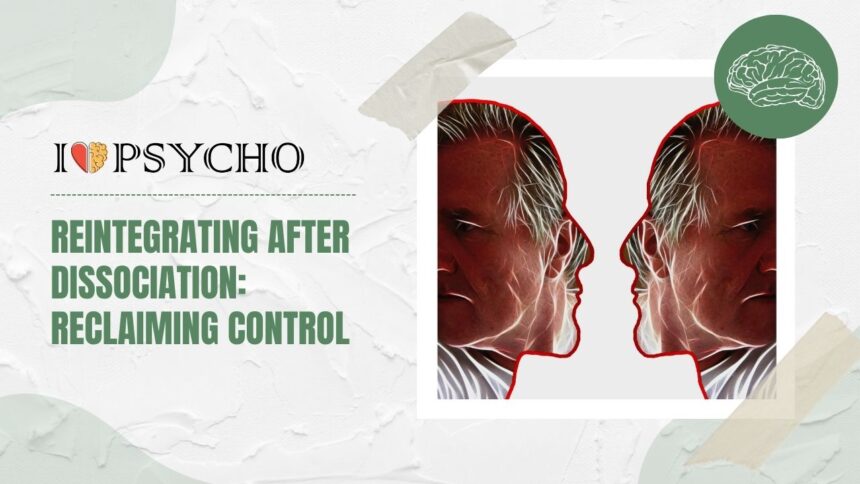Have you ever felt like you were drifting away from reality, losing touch with yourself and those around you? If so, you may have experienced dissociation. This feeling of detachment can impact your daily life in profound ways, making it challenging to stay present and connected. But fear not, as in this blog post we will delve into the world of dissociation, exploring its effects and providing practical steps to help you reintegrate and reclaim control over your mind and emotions. Let’s embark on this journey together towards healing and self-discovery!
Understanding Dissociation
Dissociation is a complex psychological defense mechanism that involves disconnecting from thoughts, feelings, memories, or even your sense of identity. It’s like pressing pause on reality, creating a mental escape hatch when life becomes overwhelming.
This coping strategy can manifest in various forms, such as feeling detached from your body or surroundings, experiencing memory gaps during stressful events, or even taking on different personas without awareness.
Understanding dissociation requires acknowledging its role in protecting you from emotional distress by compartmentalizing difficult experiences. It’s essential to recognize the spectrum of dissociative experiences – from mild daydreaming to severe dissociative disorders – each with unique impacts on daily functioning and well-being. By shedding light on this phenomenon and increasing awareness, we can begin the journey towards healing and integration within ourselves.
Effects of Dissociation on Daily Life
Living with dissociation can drastically impact daily life in numerous ways. It’s like a fog descending upon your mind, clouding your thoughts and disconnecting you from reality. Simple tasks become overwhelming as focus slips away like sand through your fingers.
Relationships may suffer as loved ones struggle to understand the sudden changes in behavior or mood swings. The feeling of being out of control can lead to isolation and loneliness, making it challenging to maintain connections with others.
Work or school performance might decline as concentration wavers and memory lapses become more frequent. The pressure to function normally while battling inner turmoil can feel suffocating at times.
Even mundane activities like cooking a meal or taking a shower can feel daunting when dissociation takes hold. It’s like watching yourself go through the motions without truly experiencing anything around you.
Navigating daily life with dissociation is an ongoing battle that requires patience, understanding, and resilience.
Steps to Reintegrating After Dissociation
Have you ever felt disconnected from your thoughts, feelings, or surroundings? Dissociation is a common response to trauma, stress, or overwhelming situations. It can leave you feeling detached and out of touch with reality.
Reintegrating after dissociation involves taking small steps towards reclaiming control over your mind and body. Start by grounding yourself in the present moment through deep breathing exercises or mindfulness techniques. Focus on sensations like the feel of the ground beneath your feet or the sounds around you.
Engage in activities that bring you joy and make you feel connected to yourself, whether it’s painting, dancing, or spending time in nature. Practice self-compassion and be patient with yourself as you navigate this process of reintegration.
Seek support from trusted friends, family members, or mental health professionals who can provide guidance and encouragement along the way. Remember that healing is a journey, and every step forward is a victory in itself.
Seeking Professional Help
Seeking professional help is a crucial step in the process of reintegrating after dissociation. A mental health professional can provide guidance, support, and specialized treatment to help individuals navigate their experiences. Therapists with expertise in trauma-informed care can offer valuable insights and techniques to address dissociative symptoms effectively.
It’s important to find a therapist who you feel comfortable with and who understands your unique needs. Whether it’s through individual therapy, group therapy, or specialized modalities like EMDR or somatic experiencing, seeking professional help can empower individuals to reclaim control over their lives.
Therapists can assist in exploring the root causes of dissociation, developing coping strategies, and fostering self-awareness. By working collaboratively with a therapist, individuals can gain valuable tools for managing dissociative episodes and building resilience.
Remember that reaching out for support is not a sign of weakness but rather a courageous step towards healing and growth. Therapy offers a safe space to explore difficult emotions and experiences while receiving validation and guidance from a trained professional.
Self-Care Techniques for Managing Dissociation
Taking care of yourself is crucial when dealing with dissociation. Start by creating a safe and calming environment at home. This could include setting up a cozy space where you feel relaxed, surrounded by things that bring you comfort.
Engage in activities that ground you, such as mindfulness exercises or yoga. These practices can help you stay present and connected to your body. Journaling can also be beneficial for processing emotions and thoughts.
Practice self-compassion and remind yourself that it’s okay to take breaks when needed. Prioritize restful sleep, healthy eating habits, and regular exercise to support your overall well-being.
Reach out to trusted friends or family members for support when feeling overwhelmed. Seeking professional help from a therapist experienced in treating dissociation can also provide valuable guidance on managing symptoms effectively.
Support Systems and Building a Strong Network
Navigating through the challenges of dissociation can feel overwhelming when faced alone. Building a strong support system is crucial in reclaiming control over your life. Surrounding yourself with understanding and empathetic individuals can provide a sense of security and comfort during difficult times.
Reach out to trusted friends or family members who are willing to listen without judgment. Sharing your experiences with those who care about you can help alleviate feelings of isolation.
Consider joining support groups or attending therapy sessions where you can connect with others who may be going through similar struggles. Having a network of people who understand what you’re going through can offer validation and encouragement.
In addition to seeking professional help, lean on your support system for emotional support and practical assistance when needed. Remember, it’s okay to ask for help – you don’t have to go through this journey alone.
The Negative Effects of Dissociation
Dissociation can have profound negative effects on individuals, impacting various aspects of their lives. One common effect is the feeling of detachment from oneself and reality, leading to a sense of disconnection. This can result in difficulties concentrating, making decisions, or even remembering important information.
Moreover, dissociation may manifest as emotional numbness or heightened anxiety levels, making it challenging to regulate emotions effectively. Individuals experiencing dissociation might also struggle with maintaining relationships due to the disconnect they feel from others and themselves.
Furthermore, chronic dissociation can lead to feelings of emptiness and hopelessness. It may contribute to increased stress levels and impact overall mental well-being. These negative effects highlight the importance of seeking support and implementing coping strategies to manage dissociative experiences effectively.
In understanding these impacts, individuals can work towards reclaiming control over their lives by addressing the root causes of dissociation and prioritizing self-care practices that promote healing and growth.
Coping Strategies for Managing Dissociation
Living with dissociation can be challenging, but there are coping strategies that can help you navigate through the experience. One effective way to manage dissociation is grounding techniques. Grounding yourself in the present moment by using your senses can help bring you back to reality.
Another helpful strategy is creating a safe space for yourself – whether it’s a physical place or a mental refuge where you feel secure and at ease. Engaging in activities that promote relaxation, such as deep breathing exercises or mindfulness meditation, can also aid in managing dissociative episodes.
It’s important to communicate openly with trusted individuals about your experiences and needs. Seeking support from friends, family, or a therapist can provide valuable assistance in coping with dissociation. Remember, it’s okay to take breaks when needed and prioritize self-care during difficult times.
Tips for Loved Ones of Someone Dealing with Dissociation
Supporting a loved one dealing with dissociation can be challenging, but your presence and understanding are vital. Listen attentively when they choose to share their experiences; empathy goes a long way in making them feel heard and supported. Avoid judgment or invalidating their feelings – validation is key in building trust.
Educate yourself about dissociation to gain insight into what your loved one might be going through. Offer practical help, like accompanying them to therapy appointments or assisting with daily tasks during difficult times. Encourage open communication without pressuring them to talk before they’re ready.
Respect their boundaries and allow space for self-care when needed. Be patient as recovery from dissociation takes time and progress may not always be linear. Remember that you are a source of comfort and stability during their journey towards healing and integration.
Conclusion
Reintegrating after dissociation is a journey that requires patience, self-awareness, and support. By understanding the effects of dissociation on daily life, seeking professional help, practicing self-care techniques, building a strong support system, and utilizing coping strategies, individuals can reclaim control over their lives.
Remember that recovery is not linear; there may be ups and downs along the way. It’s essential to be gentle with yourself and celebrate small victories. With perseverance and determination, it is possible to reintegrate after dissociation successfully.
If you or someone you know is struggling with dissociation, reach out for help. You are not alone in this journey towards healing and reclaiming control over your life. Together, we can break free from the chains of dissociation and embrace a future filled with hope and empowerment.









